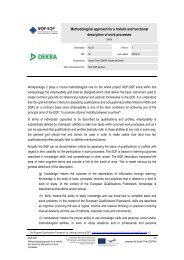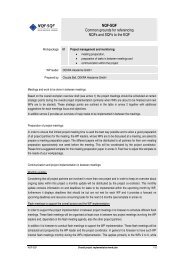Overview of National Qualification frameworks - Project-Nqf-Sqf
Overview of National Qualification frameworks - Project-Nqf-Sqf
Overview of National Qualification frameworks - Project-Nqf-Sqf
You also want an ePaper? Increase the reach of your titles
YUMPU automatically turns print PDFs into web optimized ePapers that Google loves.
The level rating <strong>of</strong> qualifications to the MQF is considered as a quality assurance mechanism. Onlyforeign qualifications which are mutually recognised can be incorporated in a protocol whereforeign awarding bodies are represented in Malta. Home-grown qualifications must satisfynumber <strong>of</strong> standards by filling in a standard application form which includes the learningoutcomes and has to be approved by MQC and by an independent evaluator representing aDesignated Authority or an academic/pr<strong>of</strong>essional expert if no such authority exists.When a protocol is signed between MQC and the public or private education and training providersthe level rated qualifications are listed in the Malta Register <strong>of</strong> Regulated <strong>Qualification</strong>s whichis available on the MQC website. This Register shall eventually evolve into a Database withthe learning outcomes and details <strong>of</strong> all regulated qualifications.The level <strong>of</strong> difficulty <strong>of</strong> any home-grown qualification is confirmed after consulting the EQF andMQF level descriptors.__ Have you already identified any mislinkings between qualifications within the NQF andthe EQF? If so, please describe briefly.NOT APPLICABLE__ Which strengths and which weaknesses do you see concerning the NQF? In what way dothese strengths/weaknesses influence the referenceability to the EQF?Strenghts:The fact that the level descriptors <strong>of</strong> the NQF are also referenced to the <strong>Qualification</strong>s Frameworkfor the European Higher Education Area (QF-EHEA) and distinguish between the followingtypes <strong>of</strong> skills makes the level descriptors more user-friendly and less generic:Applying Knowledge and Understanding;Communication Skills;Judgmental Skills; andLearning SkillsThis strength does not influence the reference capacity to the EQF as all the categories <strong>of</strong> Skills <strong>of</strong>the MQF are referenced to the Skills section <strong>of</strong> the EQF.Weakness:As originally launched in 2007 the MQF did not give qualifications a credit value to the level ratedqualifications, thus this meant that only full qualifications can be referenced to the MQF.However, following demand from stakeholders particularly students and education and trainingproviders including employers MQC felt that this need to acknowledge partial qualificationstranslated in ECTS credits should be addressed. Therefore this weakness was transformed intoa challenge to give value to all learning and reduce the number <strong>of</strong> dead-end qualifications. InDecember 2010 the Malta <strong>Qualification</strong>s Council will launch a consultation document entitled:“Classifying <strong>Qualification</strong>s: A <strong>National</strong> Awards System Referenced to the Malta<strong>Qualification</strong>s Framework: a proposal”. Through the use <strong>of</strong> credits persons with specialneeds particularly those with mental disability are motivated to achieve partial qualifications atMQF Levels 1 and 2.Page 5/5




